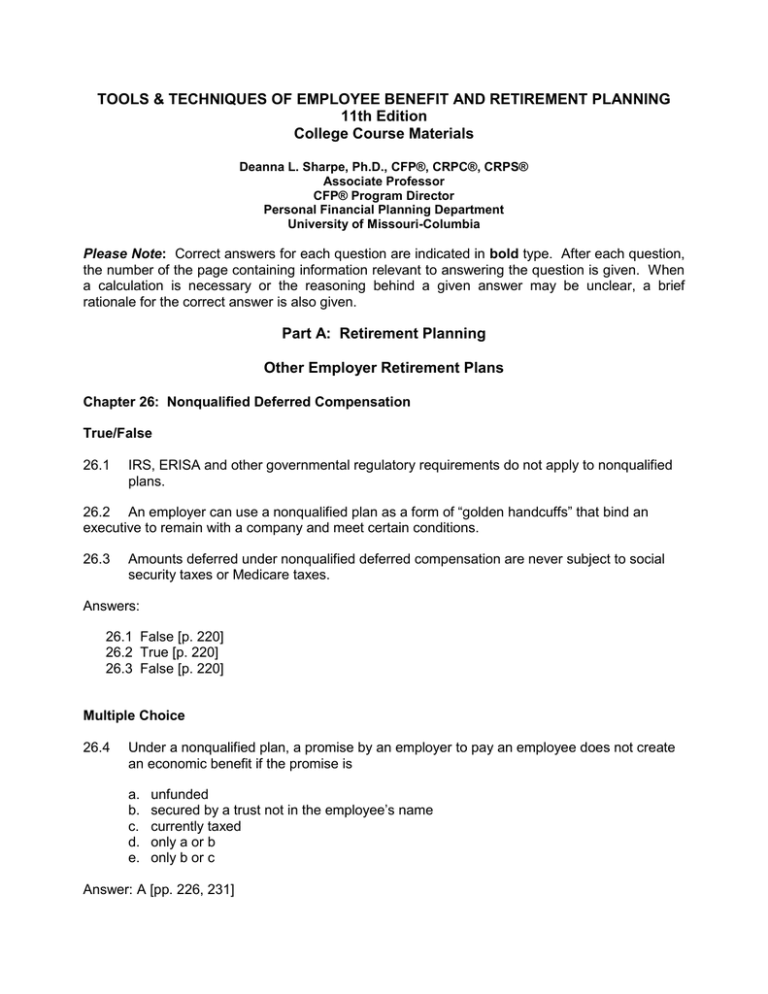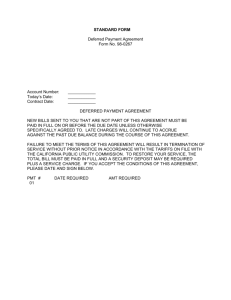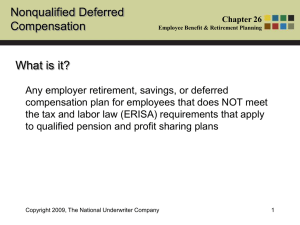TOOLS & TECHNIQUES OF EMPLOYEE BENEFIT AND RETIREMENT PLANNING 11th Edition
advertisement

TOOLS & TECHNIQUES OF EMPLOYEE BENEFIT AND RETIREMENT PLANNING 11th Edition College Course Materials Deanna L. Sharpe, Ph.D., CFP®, CRPC®, CRPS® Associate Professor CFP® Program Director Personal Financial Planning Department University of Missouri-Columbia Please Note: Correct answers for each question are indicated in bold type. After each question, the number of the page containing information relevant to answering the question is given. When a calculation is necessary or the reasoning behind a given answer may be unclear, a brief rationale for the correct answer is also given. Part A: Retirement Planning Other Employer Retirement Plans Chapter 26: Nonqualified Deferred Compensation True/False 26.1 IRS, ERISA and other governmental regulatory requirements do not apply to nonqualified plans. 26.2 An employer can use a nonqualified plan as a form of “golden handcuffs” that bind an executive to remain with a company and meet certain conditions. 26.3 Amounts deferred under nonqualified deferred compensation are never subject to social security taxes or Medicare taxes. Answers: 26.1 False [p. 220] 26.2 True [p. 220] 26.3 False [p. 220] Multiple Choice 26.4 Under a nonqualified plan, a promise by an employer to pay an employee does not create an economic benefit if the promise is a. b. c. d. e. unfunded secured by a trust not in the employee’s name currently taxed only a or b only b or c Answer: A [pp. 226, 231] 26.5 All of the following approaches are commonly used to increase the security of benefits for an employee under a nonqualified deferred compensation plan except: a. b. c. d. e. employer’s general assets reserve account maintained by employer third-party guarantees corporate-owned life insurance employer reserve account with employee investment direction Answer: A [pp. 225-226] 26.6 Under a nonqualified deferred compensation plan, constructive receipt occurs in which of the following: a. b. c. d. funds are available to employee without restriction employee does not actually receive payment employee has right to draw on the funds employee has right to receive future payments and can elect at any time to accelerate the payments e. employer sets aside Answer: B [p. 226] Application 26.7 Bob Everett is covered under a funded nonqualified deferred compensation plan that has an irrevocable trust set up for his benefit. Bob must pay income tax as soon as he is vested in contributions made to the fund, even though he does not have a right to withdraw cash from the fund until he retires. a. True b. False Answer: A [p. 225] 26.8 Bill U. Later has elected to defer earnings under an unfunded deferred compensation agreement AFTER he performed services for his company. To defer taxation on the deferred income a. he must avoid constructive receipt of the income b. plan provisions must clearly stipulate "substantial risk of forfeiture" conditions c. he can also elect to receive the deferred income as 10 equal payments rather than a lump sum d. a and b e. a and c Answer: B [p. 226] 26.9 Makework Corp. has an unfunded nonqualified deferred compensation plan. Employees covered under the plan can defer taxes on plan contributions if plan funds are a. b. c. d. e. available to company creditors subject to substantial risk of forfeiture placed in a designated trust a and b b and c Answer: D [pp. 225-226] 26.10 Reed Collier works for Encyclopedia, Inc. He has an informally funded nonqualified deferred compensation plan. Encyclopedia, Inc. can use life insurance to fund this plan. a. True b. False Answer: A [p. 225]

